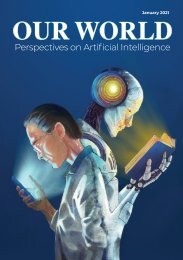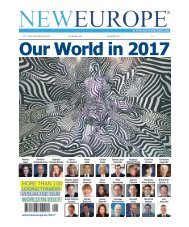FAITH & FREEDOM OF BELIEF-2019
You also want an ePaper? Increase the reach of your titles
YUMPU automatically turns print PDFs into web optimized ePapers that Google loves.
FAITH & RELIGIOUS FREEDOM
to religion, it is impossible to understand the
past, to analyse the present, or to imagine the
future of humanity. Unfortunately, the ongoing
outburst of religious fundamentalism and the
terrible acts of violence in the name of God and
religion give to the modern deniers of religious
faith arguments against religions and support
the identification of religion with its negative
aspects. The credibility of religions depends
largely on their commitment to peace, the
way to which is, in our times, interreligious
dialogue and common witness in view of the
great contemporary challenges.
Dialogue is the most effective means
for addressing problems and it promotes
confidence and mutual acceptance. It is as
such a gesture of solidarity and a source
of solidarity. Never in history have human
beings had the opportunity to bring so many
positive changes to so many people and the
global community simply through encounter
and dialogue. While it may be true that this is a
time of crisis, it must equally be underlined that
there have also never been greater chances for
communication and cooperation. Humanity is
called to react and act collaboratively, working
as a whole for our common presence and
future. Nobody—not a nation, nor a state,
not science and technology, nor a church or
a religion—can face the current problems
alone. We need one another; we need common
mobilization, common efforts, common goals.
The attitude of the Orthodox Church towards
the modern world is not a defensive one. We
do not reject modernity and its contributions
to progress. Neither do we regard it as a
threat to our identity. We discern autonomy
from autonomism, protection of individual
rights from individualism. At the same time,
we fervently call upon the representatives of
modernity to avoid identifying Orthodoxy with
anti-modernism, conservatism, traditionalism,
orthodoxism and ethnophyletism, as well as
associating Orthodoxy with the rejection of
individual rights and individualism and with
the incapacity to accept secular ethics and the
secular state.
And above all, we hold that in the Orthodox
tradition and theology, reason (λόγος) and
freedom (ἐλευθερία) are highly appreciated and
respected. We have never sacrificed reason to
a supreme authority. We have never rejected
human freedom and synergy in the name of
OUR WORLD | 2019
Bartholomew
I of
Constantinople
Patriarch of
Constantinople.
Spiritual leader of
300 million Orthodox
Christians worldwide.
the sinfulness of the fallen human being. We
are continuing this tradition when we support
the core values of Orthodoxy, person-centred
ethics, respect for human dignity, peace
and reconciliation, love and philanthropy,
the protection of the environment. This
magnificent tradition is properly expressed in
the documents of the Holy and Great Council.
In this spirit, the Ecumenical Patriarchate
is also unshakeably committed to openness.
We engage in inter-Christian, inter-religious,
inter-cultural dialogue, we discuss with secular
institutions, with contemporary philosophy
and modern science. As an example of our
activities, we would like to especially stress
on our common commitment with Pope
Francis in ecological and social issues. The
Church of Constantinople is widely known for
its environmental initiatives. The Ecumenical
Patriarchate was the first to highlight the
spiritual and ethical dimensions of the
ecological problem, to stress the importance
of the Church’s contribution to its handling,
to showcase the ecological dimensions of the
eucharistic and ascetic ethos of Orthodoxy,
and to propose ways to protect the natural
environment. We have not only reached out
to Orthodox faithful, to Christians and other
believers, but rather to every man of goodwill,
while expressing our trust in the responsibility
of every individual and especially connecting
our hopes of the positive contribution of all.
We consider that the new generation—which
envisions a world that will function as a true
“house” (οἶκος) for all humankind and strives
toward this very purpose—is interested in our
message, to be especially important. The very
life of the Church is respect indeed and care
for creation in tangible forms, as well as the
source of its ecological actions. The protection
of the natural environment is an extension of
all that is experienced in the Church. Ecclesial
life is applied ecology.
The real interests of man are served only
within an intact environment. So, we consider the
approach of the ecological crisis in connection
with social problems to be especially important.
It is Pope Francis’ and our common belief that
the current economic developments within
the framework of globalization destroy social
cohesion, solidarity and the overall function of
interpersonal relations. It is precisely this spirit
that the Papal Encyclical Laudato Si’ (2015) and
our Common Message with Him, On the World
33










